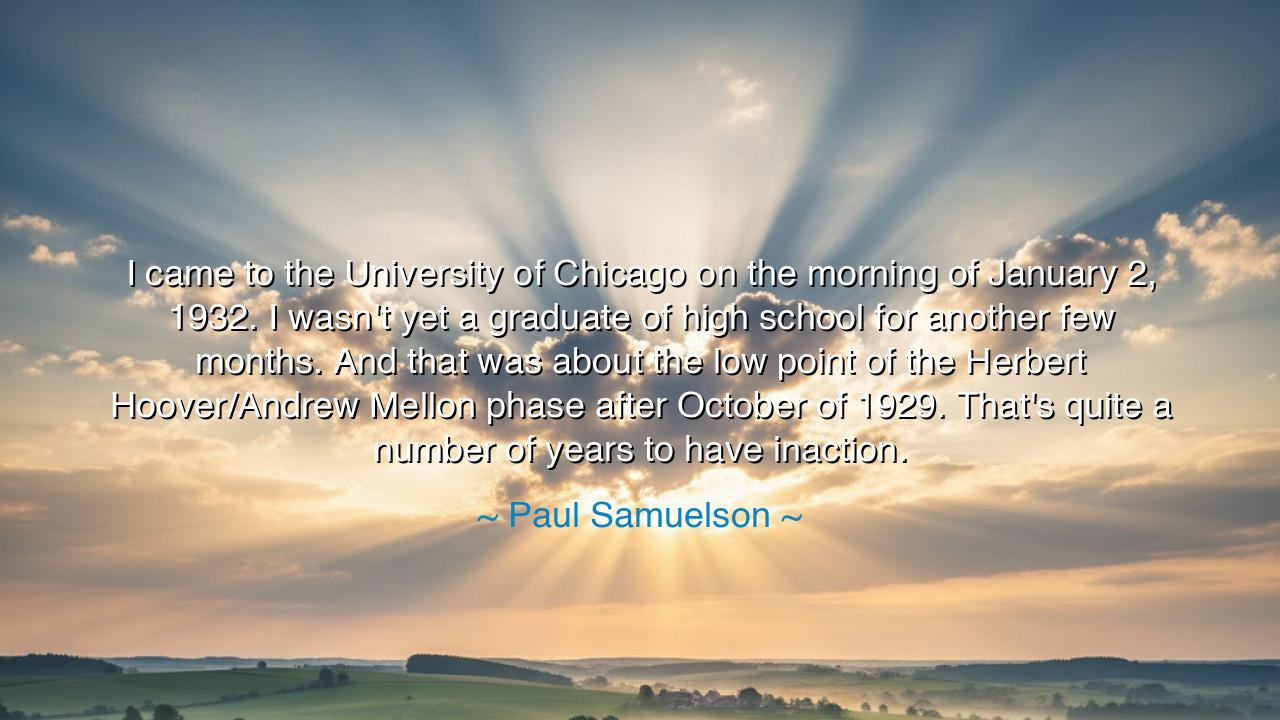
I came to the University of Chicago on the morning of January 2
I came to the University of Chicago on the morning of January 2, 1932. I wasn't yet a graduate of high school for another few months. And that was about the low point of the Herbert Hoover/Andrew Mellon phase after October of 1929. That's quite a number of years to have inaction.






Hear the words of Paul Samuelson, the great economist, who bore witness to the darkest years of a wounded nation: “I came to the University of Chicago on the morning of January 2, 1932. I wasn’t yet a graduate of high school for another few months. And that was about the low point of the Herbert Hoover/Andrew Mellon phase after October of 1929. That’s quite a number of years to have inaction.” In this reflection lies the tale of a boy stepping into manhood while a nation trembled under the weight of the Great Depression. His memory is not only personal, but prophetic, for it captures both the paralysis of leadership and the resilience of those who endured.
The date itself is heavy with meaning: January 2, 1932. It was not only the beginning of a new year, but the depth of an era of despair. The crash of 1929 had shattered fortunes, banks had fallen, families were broken, and breadlines stretched like rivers of suffering through the cities of America. Samuelson, not even finished with high school, entered the halls of learning at this moment of national weakness. His journey reminds us that greatness often begins in times of ruin, when the world cries out for new vision and new courage.
He names the phase of Herbert Hoover and Andrew Mellon, the leaders who clung to the old faith of waiting, of letting markets heal themselves, of inaction in the face of catastrophe. Their hesitation deepened the pain of millions, and their failure became the crucible from which new ideas would be demanded. Samuelson, looking back, saw this not only as history, but as a warning: that inaction in the face of crisis is itself a decision, a choice that multiplies suffering and squanders years of human potential.
History gives us many such examples. Consider the fall of the Roman Empire, when weak emperors delayed reform, allowing corruption and decline to spread unchecked. Their inaction did not preserve Rome—it hastened her downfall. Likewise, in the years of the Great Depression, delay and hesitation nearly destroyed faith in democracy itself. Only when Franklin Roosevelt rose with bold measures—the New Deal, the fireside chats, the rallying cry of hope—did the nation begin to turn from despair to resilience. From Samuelson’s perspective, this contrast between paralysis and action became a lifelong lesson in the necessity of courage.
Samuelson’s own life testifies to the power of entering into the fray, rather than waiting idly. From that early morning in Chicago, he would go on to become the first American to win the Nobel Prize in Economics, shaping theories that guided nations. His presence at such a young age in a place of knowledge was itself an act of defiance against despair: while the world collapsed, he pursued learning, as if to say, “From understanding will come renewal.” The seed of action lay not in government alone, but in the minds of those who prepared themselves to lead differently.
The lesson here is clear and eternal: in times of crisis, do not wait for conditions to right themselves. Inaction is itself a force that deepens decay. Rise early, as Samuelson did, and commit to growth, to knowledge, to the pursuit of solutions. Leadership requires not only patience but courage, not only endurance but decisiveness. Just as the tides do not stop for hesitation, so too does history not wait for those unwilling to act.
Practically, each of us may apply this wisdom. When faced with hardship—whether personal or communal—do not yield to paralysis. Take steps, even small ones, toward change. Seek knowledge when the world is dark, for in learning lies the seed of renewal. Demand of your leaders not passive delay, but the courage to act. And in your own life, remember that beginnings born in times of trial, like Samuelson’s journey in 1932, often yield the strongest legacies.
And so I say to you, O listener: remember Samuelson’s words. History punishes hesitation but rewards boldness. Whether in the fate of nations or in the quiet trials of your own life, do not let years be wasted in waiting. Be as the young man who entered Chicago on a cold January morning, carrying the weight of crisis but also the promise of renewal. For it is action, not inaction, that bends the arc of destiny.






AAdministratorAdministrator
Welcome, honored guests. Please leave a comment, we will respond soon